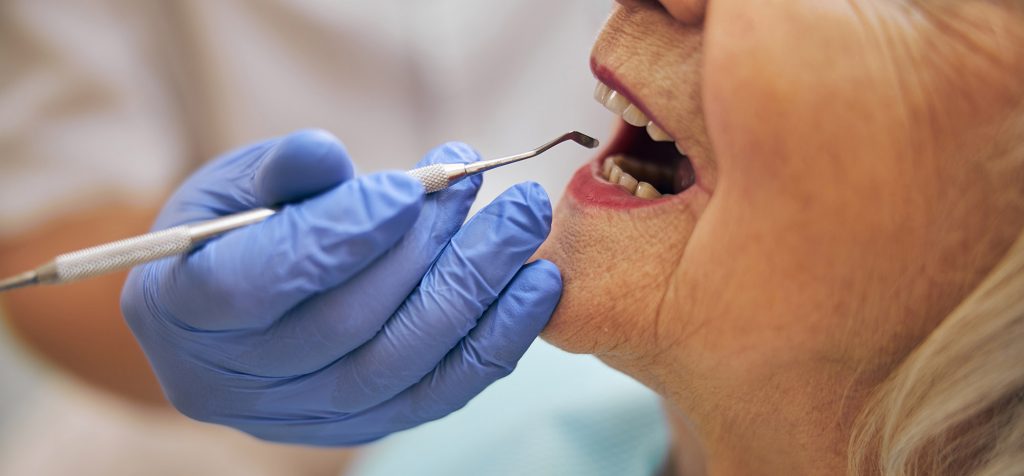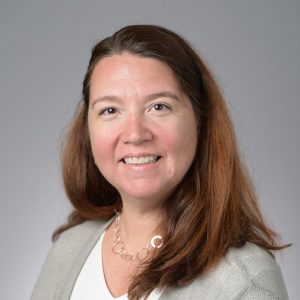Why At-Home Dental Care Is Vital For Homebound Patients
About the Article: Traveling dentists play a pivotal role in caring for homebound patients, and their services are in high demand. HCCInsights sat down with one such dentist, Dr. Joy Poskozim, whose grandmother unwittingly, but enthusiastically, shifted Poskozim’s career into at-home care. The founder of Joyful Dental Care in Chicago shared why an oral assessment is vital for all patients – and how she has an extensive network of oral health providers she can tap into for patients across the country.
HCCInsights: Can you tell us about your role?
Poskozim: I provide dental care for the homebound and those who have difficulty leaving the home. This includes evaluating the patient’s mouth, their ability to swallow, if there are any dry mouth issues, any appliances — like dentures, and what the patient and caregiver are doing to make sure the patient’s mouth is staying clean and healthy. In addition, I make sure that the right products are being used, including the best type of toothpaste and mouthwash for the patient’s situation. I also provide education for the patient, caregiver, and other family members around oral health.
And, for those in memory care, I also act as a liaison between the patient and the caregiver on oral health.
HCCInsights: How many patients does Joyful Dental Care have?
Poskozim: We have over 300 patients in over 20 communities. Of those, about half of my patients live in their own homes. I see them at different frequencies based on their situations. For example, I have a patient with ALS who I see every three months. And, with some patients who don’t have teeth, since it’s sometimes difficult for the family to take the dentures out and clean them, I’ll come in once a year to make sure everything is okay.
HCCInsights: What is your partnership like with other providers?
I have had a wonderful relationship with other providers because they rely on me and I rely on them. They trust me, I trust them. They respect me, I respect them. There is that mutuality because that person is our patient. I can do things that the medical doctor has not been trained to do and vice versa. We are partners in making sure that this person’s overall health is being well cared for.
HCCInsights: How did you start doing house calls?
Poskozim: In 2006, as a general dentist, I bought an existing practice on the North Side of Chicago. About a year and a half in, my grandmother needed a new lower partial denture. But she had horrible sciatica, and it was difficult for her to move. In fact, she had already gone through two back surgeries.
Since my grandmother lived 10 minutes from my office, my dental assistant and I went to her house, where we took impressions for the denture. After completing the steps and the needed fitting appointments, I went back with a Dremel, and the sterilized drill bits, and inserted the denture.
That next Sunday, she went to church, as she normally did — the one activity she left the house for regularly. While there, after being asked about her new teeth, she said something to the effect of, “Well, my dentist is my granddaughter, and she comes to houses, just like mine.” So, she was totally promoting me, without me even considering, “Is at-home dentistry a thing?”
I then got a call the next day from a woman who had heard my grandmother. She asked me to visit her grandmother, who had a stroke two years prior and was bedbound. They had noticed a smell coming from her mouth but couldn’t figure out what was going on.
So, I went, and it turns out that her grandmother had dentures, and not teeth. But no one, including the grandmother, had ever passed that information on to the family. Instead of brushing her teeth, they were actually brushing her dentures. So, I cleaned the dentures and gave her an overall dental checkup, and it turned out fine.
Though they felt guilty, I reassured the family, explaining that “we don’t know what we don’t know.” No one ever said to them, “Hey, lift up the upper lip to make sure that is actually her gum and not plastic. Lower the lower lip and make sure that we don’t see a ridge or a line there to see that is really her teeth and not a denture.”
Between my grandmother and that woman’s case, it really was a light switch for me. I was like, “Wow, there is dentistry that needs to be done for these people who cannot go get professional oral care. And patients, caregivers and other family members need to be educated on oral health, too.”
HCCInsights: Do you do an oral assessment for every patient?
Poskozim: That is the goal. Of course, not all patients want an oral health assessment. So that has been a problem. And there are misconceptions, like people thinking that, because someone is in hospice, they do not need dental checkups. It’s still important, possibly even more so.
There are also some situations where the families just don’t feel comfortable, not even factoring in COVID, with having me come in to take a look at their loved one’s mouth. And sometimes they don’t want to know — it’s fear of the unknown. Or they just feel that they’re without teeth anyway, so there’s no need for it. But, again, in all these situations, this is where my advocacy comes in, to let the public know that oral health is equally important to overall health. Because if we can’t eat, we can’t thrive.
HCCInsights: Which areas does Joyful Dental Care serve in Illinois and beyond?
Poskozim: I’ve been as far north as Waukegan, as far west as Crystal Lake and St. Charles, as far south as Harvey and, obviously, to the lake. I’m even going to Lemont next week. But, really, I go where there is a need. And, if there’s a need in other parts of the state or across the country, I have an extensive network of other oral health providers that I can contact.
HCCInsights: How would a home-based primary care (HBPC) provider know that a patient needs your services?
Poskozim: Every new person that providers bring onto their dockets should have a full, initial oral health assessment, which I believe should be done by a dentist.
Other times, providers may see that a patient is failing to thrive, losing weight, being picky about what they’re eating, and so on. And the provider is trying to figure out why that is, doing blood tests and other exams. So, they then call me in. When I get there, I sometimes find that it is tied to a potentially serious issue, like a loose tooth or abscess, that could have been minimized if I had been brought in earlier. But, again, in many ways, it’s about simply educating providers on why a dentist needs to be brought in early on and then regularly after that.
HCCInsights: Once HBPC providers know they need a dental consultation, what is the process for bringing you in?
Poskozim: They can call our office at 773-736-7767. My front desk coordinator has a good handle on triage questions, including “What does your loved one need? How long has this problem been occurring? Is your loved one in pain?” It can take at least an hour to make sure all the questions and concerns are addressed.
After that, dates and times are agreed upon for the visit. A credit card is then taken so that I don’t have to deal with money at the time of the appointment, unless they specifically want to pay by cash or check. The appointment is then confirmed the day before.
People can email office@joyfuldentalcare.com for follow-up questions or even starter questions ahead of the visit to get a general idea of what I can do for a particular situation. For example, someone could ask, “My mom has cats; are you allergic?” The answer is no.
HCCInsights: How do you keep the provider updated on your treatment of the patient?
Poskozim: I do whatever works best for the provider, whether that’s email or text, through a phone call or possibly other means. I will also find out how much they want documented, whether they want verbal updates, a written email or report, and so on.
HCCInsights: What type of technology do you use during a house call?
Poskozim: I coordinate ahead of time with my front desk coordinator and back office dental assistants to make sure I have all the necessary supplies ─ so I have everything I need at my fingertips, even though I’m outside of the office.
One of the main pieces of technology I use is an X-ray machine called the “Nomad.” It’s about six pounds, and it looks like a really large ray gun. But the best thing about it is that it absorbs all radiation. And, because of its weight, it’s portable. Most important, it takes a very good X-ray.
Teledentistry is also incredibly important. Because of it, I can have an X-ray and other documentation sent to me, so I can consult via teledentistry or phone, too. Teledentistry has been around for a long time. But with COVID, its importance has obviously increased.
The equipment I bring depends on the patient’s needs. For example, I will bring oral hygiene instrument setups for a full day of six-month cleanings and checkups in one community; a syringe, needles and an extraction kit for teeth that need to be removed for another patient; and impression materials for a denture case.
HCCInsights: Are your services covered by insurance?
Poskozim: For dental insurance, it depends on the state. In Illinois, for example, there is no Medicare coverage for dentistry. When it comes to medical insurance, most plans won’t cover dental treatment unless someone is in the hospital for something else and a dental problem comes up.
Many HMO plans do not recognize at-home dental care. So, therefore, they will not pay for the treatment if it is not being provided in a dental office. I believe this needs to be changed, and that’s where my advocacy work comes in.
With PPO plans, what a patient pays is based on what type of procedure is needed — and in this case, it doesn’t matter if one is at home or in a dental office.
How to Contact Joyful Dental Care:
Phone: 773-736-7767
Email: office@joyfuldentalcare.com
www.joyfuldentalcare.com

